EU Says Iran Nuclear Talks Will Resume On Thursday
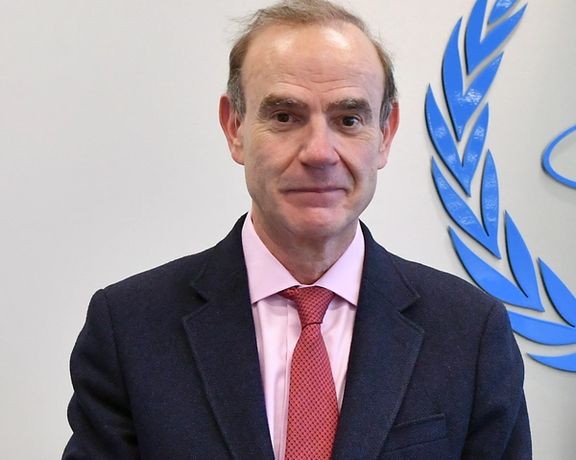
Talks on reviving the 2015 Iran nuclear deal will resume on Thursday in Vienna, a senior European Union official has said, after negotiations ended without results last Friday.

Talks on reviving the 2015 Iran nuclear deal will resume on Thursday in Vienna, a senior European Union official has said, after negotiations ended without results last Friday.
"The 7th round talks will continue tomorrow Thursday in Vienna after consultations in and among capitals," Enrique Mora, who is chairing the talks, said on Twitter. "A Joint Commission and a number of bilateral and multilateral contacts will take place."
State-controlled media in Iran announced Tuesday that talks will resume on Thursday, but Mora's announcement is the first confirmation by Western diplomats.
Talks resumed on November 29 after a five-month hiatus following Iran’s presidential elections in June. Iran had delayed its return to the talks, while continuing to enrich uranium, causing serious concern in Western capitals. However after five days of negotiations talks adjourned Friday without any results, as Iran presented new demands.
France's foreign minister had said on Wednesday the talks were likely to continue, although he added that he feared Iran was playing for time.
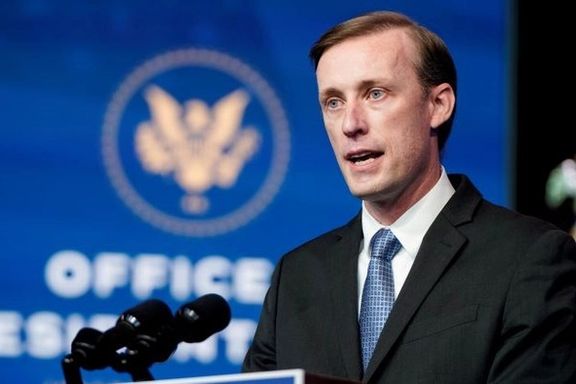
US National Security Advisor Jake Sullivan said Tuesday that the US and Russian presidents “had a good discussion” on Iran in their teleconference on Ukraine.
“Russia and the United States actually worked well together, even in tense circumstances, back in the 2014, 2015 period to produce the joint comprehensive plan of action. This is an area where Russia and the United States can continue to consult closely to ensure that Iran never acquires [nuclear weapons],” Sullivan said.
After seven rounds of multilateral negotiations in Vienna to revive the Joint Comprehensive Plan of Action (JCPOA), Iran has presented new demands unacceptable to the United States and its three European allies who signed the 2015 agreement.
Essentially, Iran is asking for all sanctions imposed since former president Donald Trump withdrew from the agreement be lifted first before it commits itself to the limitations of the JCPOA again.
The last round of the Vienna talks ended on December 3, with no clarity as to when they will resume. Iran said Tuesday that talks will restart on Thursday, but so far others have not confirmed this.
Russia and China, Iran’s diplomatic supporters, are also signatories of JCPOA and the US needs their support to put pressure on Iran. Anecdotal information says that both Moscow and Beijing were taken aback by Iran’s positions in the Vienna talks last week, but it is not clear how far they are ready to lean on Tehran.
Sullivan stopped short of providing a clue as to what Russia is prepared to do at this juncture to persuade Iran to adopt a more reasonable negotiating posture.
Sullivan was asked if a return to the JCPOA means releasing frozen funds and lifting sanction, allowing Iran to carry on with its activities in the Middle East, a point that critics of the administration’s policy of returning to a purely nuclear deal with Iran have voiced.
Sullivan replied with the argument that the nuclear deal has no impact on Iran’s proxy forces in the region. Trump’s withdrawal from the agreement did not rein in pro-Iran groups in Lebanon or Yemen, and the opposite is also true. “Nothing about the nuclear deal stops the United states’ capacity to deal with those proxies and we are prepared to do so.,” the national security advisor said.
When Trump abandoned the nuclear agreement one his demands was that Tehran change its “malign behavior” in the region and stop grooming and supporting militant forces.
The Biden Administration has also expressed concern over Iran’s regional policies and its ballistic missile program but has argued that the JCPOA should be restored first, and other matters pursued later. But critics say that once the nuclear deal is revived the US must lift key sanctions, which would give Tehran a financial lifeline, leaving no incentive for further talks.
The Biden Administration’s Iran strategy is also based on close coordination with European allies, unlike Trump who abandoned the JCPOA against the advice of allies. Sullivan reiterated that allies are important.
“The more Iran demonstrates a lack of seriousness at the negotiating table, the more unity there is among the P5+1, and the more they will be exposed as the isolated party in this negotiation. So really the ball is in Iran’s court as to whether it wants to show up and demonstrate that it’s going to be serious or not,” Sullivan maintained.
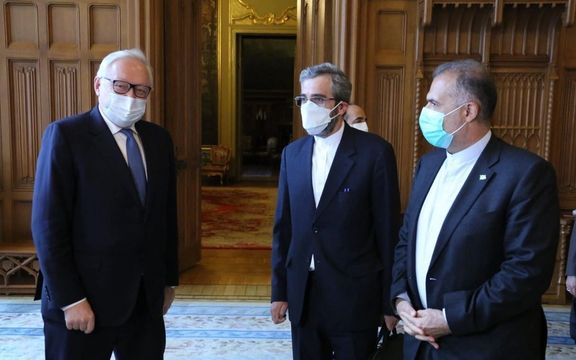
Iranian news agencies quoted chief nuclear negotiator Ali Bagheri Kani, who is in Moscow, as saying that the Vienna nuclear talks will resume on Thursday.
Semi-official news agency ISNA quoted Bagheri as saying, "We await practical steps by the West." Earlier, the IRGC-linked news agency Tasnim had revealed that Bagheri has finalized the date for the resumption of the talks after contacting European Union coordinator Enrique Mora.
Other negotiating parties have not confirmed the Iranian report.
The talks broke off on Friday "as European officials voiced dismay at sweeping demands by Iran's new hardline government," Reuters reported, adding that the seventh round of talks in Vienna is the first with delegates sent by Iran's anti-Western President Ebrahim Raisi on how to resuscitate the agreement under which Iran limited its nuclear program in return for relief from economic sanctions.
According to ISNA, Bagheri expressed hope that his consultations with Russian officials would help Iran to continue the talks "with new and effective initiatives." Bagheri added that Iran also continues consultations with China about furthering the nuclear negotiations.
Meanwhile, expounding on Iran’s proposals presented to Europeans on Friday, Bagheri said: "What we offered in those drafts were nothing new. We had simply completed previous drafts, adding what was missing in the 2015 agreement. But in fact, European and US diplomats have said that Iran reneged on earlier compromises made during six rounds of talks from April to June.
On Tuesday, the French foreign ministry expressed “disappointment” that Vienna talks failed to move forward, saying "proposals presented by Iran... do not constitute a reasonable basis that is compatible with objective of a rapid conclusion while respecting interests of all."
In an odd comment on Monday, Iran's Foreign Minister Hossein Amir-Abdollahian said while everyone went back to their capitals on Friday, Iran kept most of its delegate in Vienna to show that it is serious about negotiations.
A website close to Iran's intelligence community said Tuesday that the make-up of Iran's negotiating team is going to change and the team's approach is going to become "aggressive."
Mashregh News reported this without quoting any sources, adding that "it is the Western side that needs to show goodwill in the 8th round of negotiations." Meanwhile, The website opined that "The more aggressive the Iranian team's approach, the more likely the West would soften its positions."
The website also called for "confronting the West's media onslaught about the Vienna talks." In another odd comment, Mashregh news claimed that "as Iranian diplomats had the upper hand in the 7th round of the talks, the US Secretary of State Antony Blinken acknowledged the US delegation's weakness in the negotiations and told Reuters that the maximum pressure policy led to the United States' isolation rather than isolating Iran."
Mashregh News also claimed that the United States is also going to change the make-up of its delegation. This comes while Iran and America's delegates do not talk to each other and dialogue between them is maintained by the delegates of other JCPOA member states. However, the website added that before the new round of the talks "The Western side should be told that Iran's only motivation in continuing the talks is gaining economic profit, otherwise, Tehran is not interested in playing with words."
In another development, a White House official told reporters on Monday that President Joe Biden will raise the issue of Iran’s nuclear program in his video teleconference with Russian President Vladimir Putin on Tuesday.
The official reiterated US concerns that Iran’s advances in its nuclear program will be discussed as a major international concern during the Biden-Putin call.
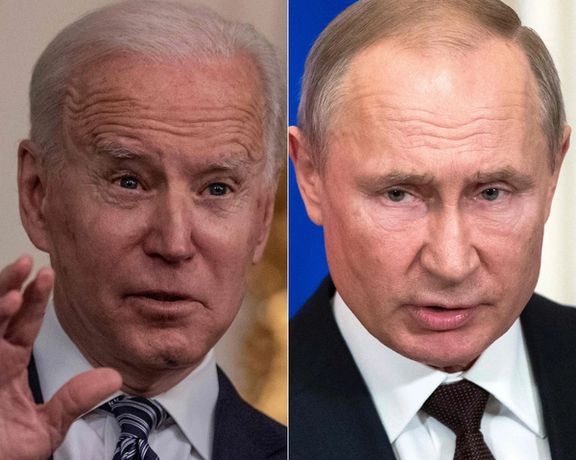
President Joe Biden will raise the issue of Iran’s nuclear program in his call with Russian President Vladimir Putin on Tuesday, the White House told reporters on Monday.
In a briefing about the crisis surrounding a Russian military buildup around Ukraine and Biden’s decision to discuss it directly with Putin, the official said, “The agenda will also cover a number of other critical issues including strategic stability, cyber, and Iran’s nuclear program.”
Talks between Iran and world powers in Vienna last week aimed at reviving the 2015 nuclear deal (JCPOA) ended without results on Friday at the dismay of the United States and its three European allies, the United Kingdom, France and Germany that are participants of the agreement. The US pulled out of the agreement in 2018 prompting Iran to expand its nuclear program.
Iran has ramped up its uranium enrichment this year, stockpiling 20 and 60-percent enriched uranium and getting closer to have enough fissile material for a bomb.
The official reiterated US concerns that Iran’s advances in its nuclear program will be discussed as a major international concern during the Biden-Putin call.
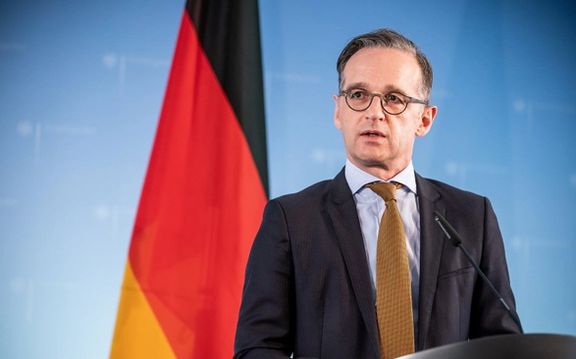
Germany said Monday that it did not regard Iranian proposals to revive Tehran’s 2015 nuclear deal with world powers as “a basis for a successful end to talks.”
Iran last week circulated in Vienna to world powers written texts on ways to restore the JCPOA (Joint Comprehensive Plan of Action), which was abandoned by the United States in 2018.
"We reviewed the proposals...carefully and thoroughly and concluded that Iran violated almost all compromises found previously in months of hard negotiations," the German spokeswoman told reporters.
The Vienna talks were suspended in June, as Iran decided for a break saying it needed to form a government after its presidential election, but later delayed rejoining the talks. At the time some participants claimed agreement was 70-80 percent done. The formal process in Vienna involves remaining JCPOA signatories – China, France, Germany, Iran, Russia, and the United Kingdom – with a US delegation led by White House envoy Rob Malley taking part indirectly.
Iran’s lead negotiator Ali Bagheri Kani has said Iran expects further talks on its basis of its draft proposals, which require lifting US ‘maximum pressure’ sanctions levied since the US left the JCPOA, before Iran reciprocates. Bagheri Kani said this would clear the way for Iran to scale back steps taken extending its nuclear program since 2019.
The German foreign ministry spokeswoman said it was unacceptable for Iran to continue such nuclear activities while talks continued, and that while Berlin remained "committed to the diplomatic path…the window of opportunity is closing more and more."
It was not clear whether the German reaction to the Iranian proposals reflected a common position of the ‘E3,’ the three western European JCPOA powers, who have generally coordinated their approach.
A senior Iranian official said Sunday that a US reluctance to lift sanctions imposed on Iran since 2018 was the main challenge in reviving the JCPOA. The previous administration of Donald Trump imposed sanctions over ‘human rights’ or, as in the case of then Iranian foreign minister Mohammad Javad Zarif, links to the office of Iranian leader Ali Khamenei.
‘Heads-up’ and Plan Bs
With JCPOA opponents in the US demanding a ‘plan B,’ Secretary of State Antony Blinken said Friday that the US would pursue other options over Iran diplomacy failed. In a call for military action Monday, Benjamin Netanyahu, former Israeli prime minister and JCPOA critic, tweeted that Israel should “act independently against Iran’s nuclear program…without any ‘heads-up’…”
Iranian foreign minister Hossein Amir-Abdollahian said Monday Iran had no ‘plan B’ to pursue “simultaneously as we negotiate.” He spoke after meeting with Syrian Foreign Minister Faisal Mekdad in Tehran.
Iran has said it expects talks in Vienna to resume once details are agreed with Enrique Mora, the EU official chairing the talks. Amir-Abdollahian flatly rejected claims, attributed by Axios to a “US source” with supposed knowledge of an Israeli intelligence briefing, that Iran “could take that dramatic step soon” of enriching uranium to 90 percent “in an attempt to gain leverage in the Vienna talks.”
Under the JCPOA, Iran enriched to 3.67 percent, but increased to 20 percent February and subsequently to 60 percent after attacks on its nuclear facilities widely attributed to Israel.
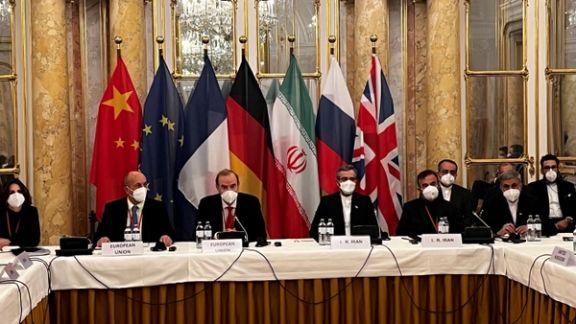
Iran reiterated Monday that it would negotiate in Vienna only on the basis of its drafts sent to world powers, demanding first the removal of all sanctions.
Resumed nuclear talks last week ended on Friday without any success, prompting the United States and its European allies to express dismay. One official told reporters that Iran reneged on previous compromises and presented new demands.
“We are negotiating in Vienna on the basis of the [three] draft documents we have put forward on the lifting of sanctions and how to stop Iran’s remedial measures [expanding nuclear activities in response],” spokesman Saeed Khatibzadeh told reporters at his weekly press briefing Monday. Documents submitted to other parties, he explained, were based on the text of the JCPOA and on the previous six rounds of talks in Vienna, held before President Ebrahim Raisi (Raeesi) took office.
“There is basically no talk of anything as a step-by-step deal or interim plans,” Khatibzadeh added, referring to Iran's demands that post-2018 sanctions should be removed all at once.
Iran’s lead negotiator Ali Bagheri Kani in an interview broadcast by al-Jazeera television Saturday said that “any sanctions in violation and not consistent with the JCPOA should be removed immediately.” This included “all the sanctions imposed or re-imposed under the so-called ‘maximum pressure’ campaign of the US,” and that Iran would in turn return its nuclear program to the limits of the JCPOA, the Joint Comprehensive Plan of Action.
Raisi briefly referred to the nuclear issue in a televised talk Sunday, saying he was pursuing the "lifting of sanctions" based on proposals Iran had made to world powers.
One of the two main documents includes Iran's analysis of relevant sanctions while the second lists the steps Iran would take in return in scaling back aspects of the nuclear program it began expanding in 2019 after the US left the JCPOA in 2018 and imposed ‘maximum pressure’ sanction.
Khatibzadeh suggested that western media had been spreading pessimism about the Vienna talks and advised Iranian media not to "copy-paste" western media in order to score domestic political points. "Don't become hostile media's domestic megaphones," he warned.
Deadlock over sanctions?
The spokesman said the onus lay now with other parties to the talks – formally the remaining signatories of the JCPOA China, France, Germany, Russia and the United Kingdom; indirectly the US – to respond to the Iranian proposals. "Other aspects [of renewing the 2015 agreement] in the draft proposal can't be discussed before Iran is assured it can benefit from the lifting of sanctions,” he said.
In an interview with Italy's ANSA Sunday, Bagheri Kani insisted that Iran would not "backtrack on its demands" if the JCPOA is to be revived. He said that while Iran’s commitments over nuclear restrictions were clear, there had been “deadlock about many of the sanctions that the other side must lift.”
Since the United States left the JCPOA in 2018, it has imposed a variety of sanctions on Tehran, crucially threatening third parties with punitive action for buying Iran’s oil or dealing with its financial sectors. Officials in the previous administration of President Donald Trump made clear their intention – even with supposedly ‘non-nuclear’ sanctions − of thwarting any subsequent attempts to revive the JCPOA.
Khatibzadeh said Iranian negotiators would stay in Vienna "as long as required” and remained committed to "strike a good deal.” He said talk would resume later this week after a scheduled phone call between Bagheri Kani and Enrique Mora, the European Union official chairing the talks.
Responding to a question on whether Iran's missile defense program and its accession to the Financial Action Task Force (FATF), the international money-laundering watchdog, were being discussed in Vienna, Khatibzadeh said Iran will not make commitments other than those related to its nuclear program.